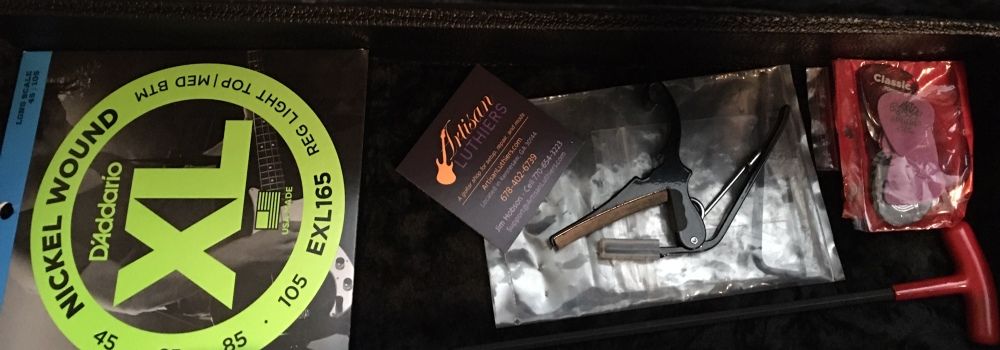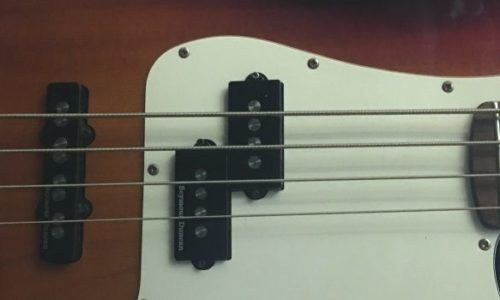What to Keep in Your Guitar Case

A List of Items to Have in Your Guitar Case
See a list of things to pack in your guitar case or bass case. Explore the essential tools, accessories, and gear to carry in your guitar case.
Your case is intended to be more than simply a container to transport your guitar or bass. There’s a reason most cases have pouches and storage compartments, right? If you’re unsure as to what to put in a guitar case this article is for you. Read our list of common items people carry in their guitar case and see a few creative additions.
Identifying Information & Markings
Nameplate & Business Cards
A nameplate on your case may just keep honest people honest. Sometimes your guitar may get misplaced, left behind, lost in luggage, or taken. With a nameplate, you have a better chance at getting it back.
If you are a commercial traveler you may want to put some distinctive identification on your case to minimize chances of another traveler picking it up at luggage claim.
Several business cards should also be in your case if you gig. You never know when you’ll have an opportunity to make a new contact.
Strings & String Winder
We all know that strings break, and it’s never convenient. If you gig or travel you’re setting yourself up for frustration if you don’t have a backup set of strings. Obviously, the string winder is for convenience, however; if you need to change strings at a gig it’s far more than a convenience. For about $10 you can buy a peg winder at Sweetwater (which also has free shipping).
The website Musicoomph.com has a shortlist of recommended peg winders. For a convenient portable size peg winder, they recommend the D’Addario Pro-Winder. Their website says these things about this peg winder, “It works on both electric and acoustic guitars and doesn’t pull out pegs. It has a better grip than many other string winders on the market too. What’s even cooler is the fact that the winder also has a built-in string cutter and bridge pin puller. You can look at it as a Swiss Army Knife of winders.”1
Guitar Tuner
It should go without saying why a guitar tuner should be in your case. You have a lot of options, ranging from chromatic tuners, polyphonic tuners, and digital strobe tuners. The best guitar tuners for travel range from simple clip-on tuners to pedal-type chromatic guitar tuners.
Need a tuner for a bass? If you are looking for a clip-on tuner, make certain that it is designed for the lower frequencies of a bass. A lot of the inexpensive tuners are designed for a guitar and are ineffective for lower frequency ranges.
Chromatic Tuners
For a good, reliable chromatic tuner we are fans of Snark tuners. In particular, the Snark ST-2 Super Tight model. It’s very affordable, coming in around $20. It’s also very versatile as it works on electric and acoustic guitars and most bass guitars. The display is easy to read, and battery life is insanely good.
Polyphonic Tuners
Polyphonic tuners enable you to strum all of your strings together and instantly view the tuning of each individual string. The GuitarWorld website promotes the TC Electronics PolyTine3 tuner. Their website cites the following as reasons to buy the guitar tuner, ” If you’d rather devote pedal-board space to cool, creative effects, this really could be the best guitar tuner for you. Polyphonic functionality is part and parcel of the PolyTune line – and the dinky display’s 109 LEDs do a good job of clearly conveying the potentially complicated view of your guitar’s full six-string tuning. “.2
Digital Strobe Tuners
Strobe tuners are generally not what you would consider “case and travel friendly”. We mention them here to introduce you to the tools used for professional guitar setups. The top manufacturers for strobe tuners are Peterson and Korg. The Peterson VS-R rack tuner is incredible, as it should be for the $400+ price tag. The Korg Pitchblack Pro rack tuner is easy to use, very accurate and can be purchased for around $150.
Guitar Strap
If you use a strap it should be in your case. If you have a high quality guitar strap, you should remove it from your guitar and carefully store it in the case. It’s never a bad idea to keep a backup nylon strap rolled up in your case.
PRO TIP: If you use locking strap buttons, make certain the strap in your case has the matching hardware. If you swap out your strap and forget about adding the male hardware, you won’t be using your new strap.
Picks in a Container
Always a good idea to carry some extra picks in a guitar pick box. You have options ranging from a small, inexpensive tin container, to customized wood boxes and leather cases.
Capo
A capo is a handy tool for playing and maintenance. If you use it to play, it definitely should be in your case.
Ear Plugs
If you’re exposing yourself to loud music, practice, or a gig, you need to make certain you have ear protection. The harsh reality of potential hearing loss is discussed in detail in a 2019 article by inSync Magazine (online). Per doctor Todd Page, “the fact that repeated trips into the TTS zone eventually lead to what is called a Permanent Threshold Shift (PTS), which irreversibly affects sound perception. Typically, PTS will affect the 4kHz frequency range (the upper midrange) and then expand into surrounding frequencies over time, with the length of exposure playing an important role. Affected hair cells and nerve fibers lose their threshold responses, and some even inappropriately increase response, which wreaks havoc on the accurate sound discrimination that musicians depend on. “:3
We advise to not rely on cheap foam “construction worker ear plugs”:. The website MusicianOnaMission.com has a list of The 5 Best Earplugs for Musicians in 2020. Their article considers lowering the volume, controlling sound quality, comfortable fit, and other key criteria.
A very popular choice for musician earplugs is the LiveMus!c HearSafe Ear Plugs.
Whammy Bar
Even if you don’t use your whammy bar you should keep it in your case. It will keep it from getting lost and it doesn’t take up much space.
Cleaning Cloth
Any responsible guitar or bass owner recognizes the value in taking care of their instrument. If you will take just a few minutes to wipe down your instrument, it looks better and the finishes will last longer. We recommend keeping a small micro-fiber cloth in your case. Occasionally you may want to wash the cloth, but do not use fabric softeners if you do.
Basic Tools
If you’re taking your guitar away from home you need to have at least a few basic tools. You need to be able to do basic tasks such as changing strings or tightening loose screws. If you do some of your own tech work, but don;t have a true tech bench, it’s a good idea to keep more tools in your case. Among the tools you may want to keep in your case are:
- Wire cutter pliers for string changes
- Phillips head screwdriver
- Flat head screwdriver (small head)
- Allen wrenches (hex wrenches)
- Nut driver with 8mm, 10mm sockets.
Less Important Extras
Your personal needs may call for some extra goodies in your case. In speaking with a number of players, novice to professionals, these are the extras most often mentioned:
- New 9v battery for active electronics and pedals.
- Bridge pins for your acoustic guitar.
- The playlist for your gig.
- A pen and small notepad. Great for autographs and phone numbers.
- Small flashlight (handy for dark venues)
- Tissues, in the event you’re moved by the bass players solo.
What do you keep in your guitar case? Feel free to leave a comment to improve this article!
DISCLAIMER: Unless specifically stated, Artisan Luthiers does not endorse any particular products mentioned in this article. This article is for general information and consumers should do their own research before buying or using any particular product. This specifically includes, but is not limited to, safety Personal protection equipment (PPE) or tools.
FOOTNOTES & CREDITS
- 1 Gavin Whitner, “Best Guitar String Winders for Effortless String Changing”, May 11, 2020, Available from MusicOomph.com
- 2 Chris Bird, “10 best guitar tuners 2020: chromatic, polyphonic and strobe guitar tuners”, March 30, 2020, Available from GuitarWorld.com
- 3 Todd Page, “The Musician’s Guide to Hearing Protection — from a Doctor!”, July 30, 2019, Available from inSync




Great ideas! I’ve often been out and needed these things but never remember to put them in my case. I’m doing it today.